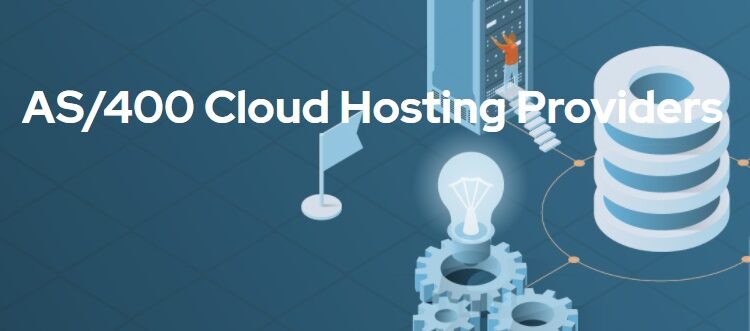Most growing businesses have begun to aim at cloud computing for most of their operations. This information technology has become every business’ go-to option hence the prioritization of AS400 cloud providers as opposed to the traditional vendors. The computing resources such as the servers, applications, development tools, data storage, and networking of the business are handled from a remote data center by the AS/400 cloud providers. The firms are however required to pay a monthly subscription to their cloud providers depending on how they use the services. There are three most common cloud services i.e.
- SaaS(Software-as-a-service)
This type of software is found within the cloud and can be accessed by a firm through the web browser, mobile and desktop operating system, and a desktop client.
- PaaS(Platform-as -a service)
The business is provided with an on-demand platform from which its software developers can run, develop and manage applications. The platform on-premises has hardware, infrastructure, software stack, and development tools. The venture does not also get costs, complexities, and flexibility issues. Additionally, the cloud providers usually host the networks, servers, database, middleware, and operating system software in their data centers.
- IaaS( Infrastructure-as-a-service)
This service provides a business with all the essential computing resources such as virtual servers, physical servers storage, and networking. The resources are availed to the firm via the internet on a pay-as-you-go type of payment plan.
- Serverless computing
When using this service, the business developers are freed since they offload all the backend infrastructure management tasks to the cloud provider. The tasks include patching, scheduling, provisioning, and scaling. The clients only pay for the resources at use as the application operation continues.
Many ventures can now comfortably stimulate their transformation projects and continue with their activities normally. It is however surprising that most businesses using the AS400 have not yet considered moving to the cloud and choose to continue using the servers. Experts have an opinion that the cloud is important especially for businesses looking to enable themselves. Below are some reasons why a business should consider moving to the cloud.
- Cost and Scalability
On-site data operation requires a business to invest heavily in their equipment and skilled employees. When the business has a cloud provider, they do not have to worry about getting expert employees since they only pay for the required services. It is always a challenge for most ventures to acquire new machinery since they cost a lot and most realize they have to repeat the cycle whenever making it very costly compared to when the firm outsources from cloud providers.
- Versatility
Clouds are usually designed to be flexible hence making it possible for a business to achieve agility hence enablement. When a firm has its AS400 transitioned to the cloud, it can easily adapt and have remote operations without any interference with its IT systems.
- Data security
Most people have had speculations about the security of their data in the cloud. It is however clear that the data when backup in the cloud is less likely to be contaminated therefore enhancing the data security measures. Users also have the option of using a private cloud in case they have a hard time believing that their data is safe, but it may be a bit more costly. Data stored on the cloud are however safer than data stored in a business service within the organization since they can be easily breached.
- Access to professionalism
Hiring cloud providers means that the business has entrusted experts with their system management. The services offered by cloud providers are usually done by people who have experience in IBM technology therefore surety that the business IT will help the business achieve its goals.
- Disaster recovery
Most cloud providers give their clients the chance to test the applications and check to ensure that all the operations work and all issues are examined before they transition to the cloud. The customers also get assured that the applications use high-level OS during operation.
Types of cloud computing
- Public cloud
Businesses that use this type of cloud computing have the computing resources available to them on the public internet. The service provider avails the SaaS applications, bare metal computing hardware, and individual virtual machines on the internet. The best public cloud providers always take full responsibility and control of the hardware, data centers, and infrastructure in which the business runs its workloads. Through this, a business can quickly access data, applications, and access high network connections, therefore, ensuring high-performance levels. The data center infrastructure in this type of computing is however shared by all the public cloud users.
- Private cloud
A business under this type of cloud computing has its computing resources and infrastructure specifically dedicated and accessible to only the customers. it assures the client of access control, resource customization, and total security on-premises in the client’s data center. Many firms opt for this type of computing since it enables them to meet the organization’s compliance requirements when it comes to cloud services. Others select this type of cloud computing since they deal with many private and confidential data such as personally identifiable information, financial data, confidential documents, medical records, and other various types of highly sensitive data storage.
- Hybrid cloud
This is a combination of both public cloud and private cloud computing. The business workloads and applications are all placed in a single flexible infrastructure that connects both its cloud services. The company is provided with the opportunity to manipulate and choose where to move the applications and workloads depending on the circumstances at hand. This way a firm can meet its goals and comply in a more cost-efficient cloud since they can pick what favors them.
- MultiCloud and Hybrid MultiCloud
Multicloud involves the application of more than two or more clouds and infusing and operating with more than one cloud provider. It involves the use of several cloud services from more than one reputable cloud provider. Hybrid MultiCloud on the other hand includes the use of two or more public clouds together but on a private cloud platform.
Conclusion
IBM cloud providers have provided businesses with solutions that are flexible, less costly, and portable. Businesses have a challenge when it comes to owning and operating most computing resources such as servers, networking, databases management, and software applications, among others. Accessing such resources on their own can be expensive as well as getting experienced workers to help operate them. Cloud providers make this easier for them by handling the resources over the internet. Most businesses are beginning to slowly transition to the cloud and are trying to achieve their compliance requirements, security uniqueness and handle the geographical implications to ensure that their ventures are enabled.





